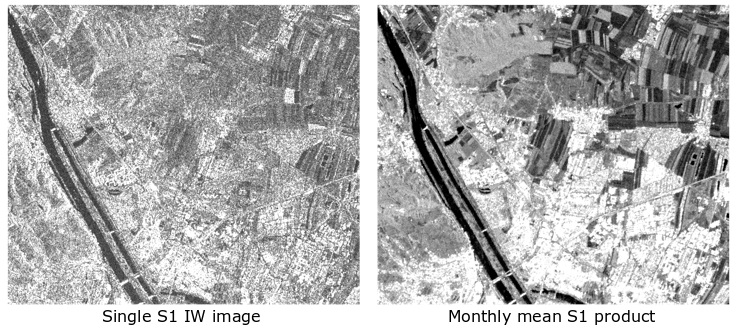3.4.3. Sentinel-1 products
Index
- Sentinel-1 Data Composites
- Mean products
- Wetness
Sentinel-1 Data Composites are created by the Remote Sensing Group ofTU Wien. A fully customized pre-processing chain is applied to the Sentinel-1 Level 1 SAR data, including calibration, georeferencing, terrain correction, format conversion and compression, quality control, etc. The resulting backscatter data are used and delivered as combinations of either different polarisations (e.g. V/V + V/H) and timely averages (e.g. monthly or seasonal). Additionally, false colour composites are created (e.g. RGB combinations of different polarisations at different times of year). Due to the nature of their visual impression, these composites nicely show the characteristics of the sensor to identify different types of land cover.
Left: Landsat-8 RGB image of London area, UK. Middle: False colour composite (RGB) of Sentinel-1 backscatter data over London area, UK. Red band shows mean of backscatter (VH) during summer (Jun-Jul-Aug), Blue band shows mean of backscatter (VH) during winter (Dec-Jan-Feb), and Green band shows the ratio of the Red and Blue band (mean_summer/mean_winter). Right: False colour composite (RGB) of Sentinel-1 backscatter data over London area, UK. Red band shows mean of backscatter (VV) during winter (Dec-Jan-Feb), Blue band shows mean of backscatter (VH) during winter (Dec-Jan-Feb), and Green band shows the ratio of the Red and Blue band (mean_summer/mean_winter). This composite highlights the variation of backscatter due to different polarizations. |
The mean products consits of a single dataset representing the average value per pixel over a defined period. These can be generated at five, ten or monthly intervalls. These higher level products are valuable as single acquisition dates contain abundant noise.
|
| Wetness or soil moisture |

